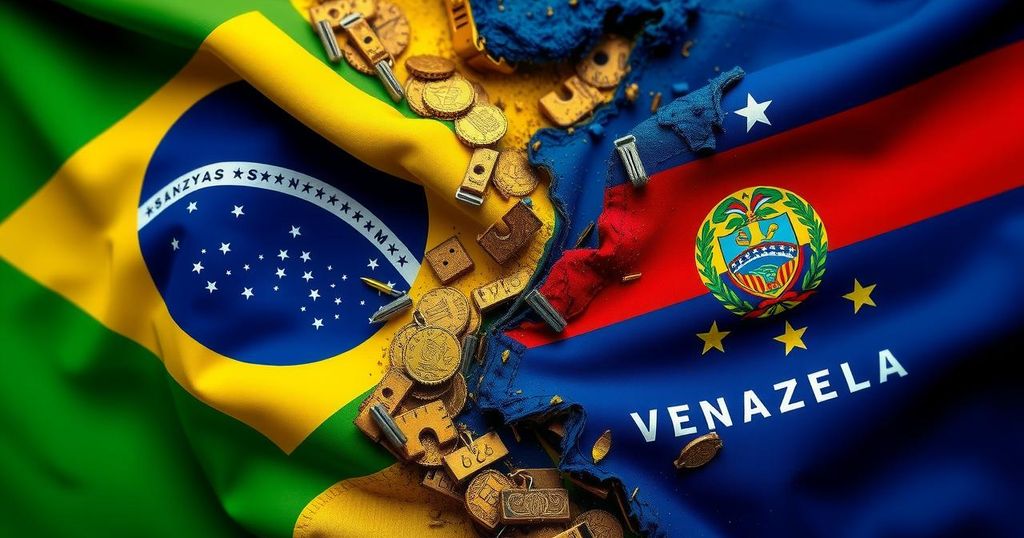The Brazilian government has publicly criticized Venezuela for escalating tensions and resorting to personal attacks against its officials, particularly concerning Brazil’s stance on Venezuela’s BRICS membership and recent electoral disputes. Brazil emphasized its commitment to respectful dialogue while expressing concerns over the deteriorating relations.
The Brazilian government has expressed its concerns regarding escalating tensions with Venezuela, particularly in relation to personal attacks directed at Brazilian officials and President Luiz Inácio Lula da Silva. The Brazilian Foreign Ministry issued a statement indicating its surprise at the “offensive tone” adopted by Venezuelan authorities, emphasizing that such rhetorical escalations contradict Brazil’s respectful approach to its neighbor. The tensions heightened following comments made by a senior Brazilian adviser, which suggested that Brazil had not supported Venezuela’s application to join the BRICS nations at a recent summit. This was compounded by disputes over the legitimacy of the results from Venezuela’s July presidential election, where Brazilian officials have called for greater transparency. In response to these developments, Venezuela’s Foreign Ministry summoned Brazil’s chargé d’affaires in Caracas to officially register its disapproval of statements made by Brazilian representatives. They accused Brazil’s former foreign minister and current adviser Celso Amorim of acting on behalf of American interests and jeopardizing the bilateral relationship. Initially, Brazil refrained from commenting on the matter to avoid further provocations; however, the situation escalated with the Venezuelan police disseminating a social media image threatening Brazil. The Brazilian Foreign Ministry reasserted its commitment to maintaining non-interventionist principles while expressing its desire for constructive dialogue and mutual respect. Celso Amorim acknowledged the existing “discomfort” between the nations and suggested that any improvement in relations would depend on Venezuela’s actions. Meanwhile, Venezuela’s electoral authorities attributed their inability to publish detailed election results to technical issues linked to cyber attacks, a claim contested by the opposition, which has produced evidence to support their assertion of electoral fraud. As discussions continue, the Brazilian government highlighted its recent decisions regarding the inclusion of Venezuela in BRICS, noting that they believe member countries should have significant regional influence, a criterion Venezuela currently does not satisfy. Venezuela has responded critically, likening Brazil’s stance to actions taken against the country by U.S. sanctions. Ultimately, Brazil’s Foreign Ministry has reiterated its commitment to fostering partnerships grounded in dialogue and mutual understanding. The ongoing disputes illustrate the complexities of diplomatic relations in the region, particularly with the backdrop of Venezuela’s internal political instability and challenges to its electoral integrity. Brazilian President Lula, along with other regional leaders, had sought to mediate the tensions following the election, but those efforts have not resulted in significant diplomatic progress.
Brazil and Venezuela share a complex relationship marked by historical ties and recent political tensions. The political landscape has strained interactions between the two nations, particularly following disputes surrounding Venezuela’s presidential elections and its attempts to join multilateral groups such as BRICS. Brazil’s previous administrations have generally maintained a supportive stance toward Venezuela; however, President Lula’s current government faces new challenges as it navigates the fallout from allegations of election irregularities in Venezuela and growing criticisms from its government. The escalating rhetoric from Venezuela has prompted a more defensive posture from Brazil’s Foreign Ministry, which underscores traditional diplomatic norms while navigating their sovereignty interests and regional influence.
The diplomatic strain between Brazil and Venezuela underlines significant diplomatic challenges within South America. As Brazil confronts intensified verbal assaults from Venezuelan officials, it remains committed to fostering open dialogue, respect, and the principles of non-intervention. However, this tension could impede efforts to achieve greater regional unity, particularly against the backdrop of disputed electoral processes in Venezuela and the evolving dynamics of multilateral organizations like BRICS.
Original Source: apnews.com






